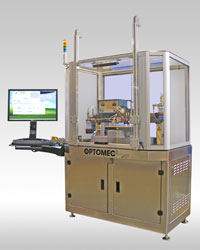Optomec announced today that Florida State University (FSU) has purchased an Aerosol Jet deposition system.
The system, which is installed at FSU’s Materials Research Building, will be used by researchers at the High-Performance Materials Institute (HPMI) for the development of multifunctional composites incorporating printed sensors. FSU plans to use these embedded sensors for damage and environmental change detection, structural health monitoring, energy harvesting and more.
 Aerosol Jet deposition system
Aerosol Jet deposition system
The Aerosol Jet system is ideally suited to be part of the FSU facility for a number of reasons, including: its fine line (<10 micron), maskless deposition capability, the ability to successfully deposit a wide range of conductive and nonconductive materials, and the ability to print conformal patterns on 3-dimensional structures with ease. All of these features are advantages over inkjet printing and were a major factor in their decision to purchase the Aerosol Jet system. Currently, researchers at FSU are using the Aerosol Jet system to fabricate sensors for use in advanced multifunctional composite applications.
Dr. Tao Liu, an HPMI principal investigator, states, “Optomec’s Aerosol Jet system should prove to be an excellent resource toward helping HPMI in developing advanced multifunctional composites complete with sensors that are an intrinsic component of a composite structure.”
The High-Performance Materials Institute (HPMI) is a multidisciplinary research facility at Florida State University. The Aerosol Jet system is located within the new 45,000-square-foot Materials Research Building, which houses the latest state-of-the-art equipment and facilities for materials research, especially designed for research in nanomaterials. HPMI’s ultimate goal is to become the major provider of advanced technology for the nation and the world in advanced composite materials. Over the last several years, HPMI has proven a number of technology concepts that have the potential to narrow the gap between research and practical applications of carbon nanotube-based materials. These technologies include magnetic alignment of nanotubes, fabrication of nanotube membranes or buckypapers, production of carbon nanotube composites, modeling of nanotube-epoxy interaction at the molecular level, and characterization of SWNT nanocomposites for mechanical properties, electrical conductivity, thermal management, radiation shielding and EMI attenuation.
Dave Ramahi, Optomec President/CEO, states, “Florida State’s HPMI is a world-class facility doing ground-breaking work in the area of nanomaterials for advanced intelligent structure applications. We are very pleased that they chose to enhance their portfolio with Optomec’s Aerosol Jet printed electronics solution.”
Source: http://www.optomec.com/